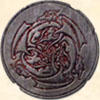Hiyal - City of Intrigue
About 360 miles northeast of golden Huzuz, at the rim of Suq Bay, lies the gray, industrious city of Hiyal. Set in the low valley of the river Al-Wahl, Hiyal is cloaked in the smoky stench of its foundries and kilns. The shroud seems to nurture the clandestine, for in the city's dark alleys and back rooms the deals of smugglers, thieves, and unscrupulous power brokers are made.
Population: 600,000 permanent residents. If beggars and transients are included, the number may swell to 900,000.
Features of the City: Hiyal's trademark is its smoky inversion, literally capping the city with pollution. Not even the breezes from Suq Bay can scrub the city clean. Its buildings are in muted shades of gray, covered by dirt and grime. Only the sultana's palace is an exception, because it is continually and rigorously cleaned by slaves.
The people of Hiyal have a reputation for being untrustworthy, duplicitous, and sharp in their business dealings with each other and outsiders. For the most part, this is untrue, but the taint of such a brush acts as a magnet for less-than-honest individuals who are drawn to the city. In addition to legitimate business, Hiyal is often the site for gray dealings, covert transactions, smuggling, and illegal activities—most of which are carried out by transients with permanent connections in the city.
Newcomers to Hiyal might wish to visit these sites:
• Great suq. Much as the mighty bazaar of Huzuz is world-famous, so too is the suq of Hiyal, a maze of covered passageways and enclosed streets. In the main corridors of this labyrinth, all manner of legal goods can be found. In the shadows, all manner of illegal and forbidden goods can be found, too.
• Foundries. Located upstream on the sluggish river Al-Wahl, these foundries turn out some of the finest weapons in Zakhara. Each year, the mamluks of Qudra commission hundreds of high-quality swords and spearheads from the foundries. Hiyal pays taxes to the Grand Caliph with the proceeds. Many great weaponsmiths and armorers come to Hiyal to practice their craft. Their fires blaze through the night. Among the respected smiths include the House of Bulad (see "Key Figures Outside the Court").
Major Products: Coal, iron, steel, weaponry, armor, metalwork, slaves (black market), information (black market), pottery.
Armed Forces: 8,000 footmen; 1,500 cavalry; 2,000-man palace guard; 2,000-man city guard; two mercenary barbarian units, 1,800 strong combined; five units of mamluk infantry, 5,000 strong combined; three units of mamluk cavalry, 900 strong combined.
Major Mosques: The largest temple in the city is an open mosque, where all enlightened people may pray. Only slightly smaller in size and grandeur are mosques devoted to Najm, Hajama, and Zann:
Hajama: Imam Ramadayah bint Kolos min Hajama (hfP/e/14) Najm: Imam Raman bin Alurah min Najm (hmP/m/16) Zann: Imam Qonta bin Mala (hmP/e/12)
Each of the three structures has a large number of support buildings, including dormitories, schools, courtyards, and kitchens. The mosque of Najm is the newest of the three, and has seen extensive renovation since the son of the sultana took charge of it.
Rumors and Lore: Hiyal is a city of rumors, buoyed by the constant sweep of this scandal or that secret. Two stories in particular are common coinage on the streets, one recent and one as old as the city itself.
Here is the ancient tale: The maze work of the great suq is itself a gateway into an even greater marketplace, which exists under skies never seen in the Land of Fate. This greater suq exists beside, below, and beyond the covered market stalls that all citizens know. It is a shadow world where lives are traded as common coinage, and all manner of wonders can be purchased, including genies, magical items, and tokens of the gods. Explorers cannot enter this greater suq through any precise door. Instead, they must pass through a number of gateways to reach its strange halls. The noble genies may know of the secrets of the greater suq, but they keep them hidden.
Here is the more recent tale: Prince Omar has demanded (and received) a portion of the Bulad estates and foundries for private research. The seized property has been walled off, save for a single entrance, which is guarded by mamluks loyal to Omar. Efreet have been seen at the site. So too have members of the Brotherhood of the True Flame. The story on the streets is that Omar has involved himself with some form of barbarian magic, and is creating a beast of molten metal to do his bidding.
